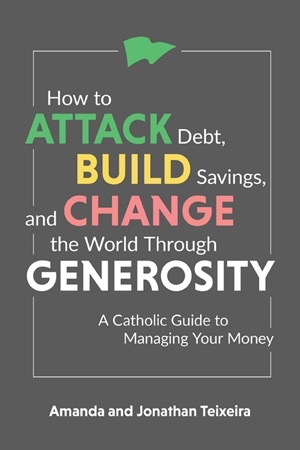Or, when worlds collide.
As many readers here will know, I’ve been a book reviewer for our local Catholic diocesan newspaper, The Catholic Post, for many years. And when I saw this new book, I knew I would have a great opportunity to bring the two worlds together.
This is a joint post with Reading Catholic and The Catholic Post. I welcome your feedback!
You know that feeling when two worlds collide? I experienced that recently—in a good way.
It happened when I learned of the new book by Amanda and Jonathan Teixeira, “How to Attack Debt, Build Savings, and Change the World Through Generosity: A Catholic Guide to Managing Your Money,” which, as the title implies, integrates financial skills and planning into a Catholic faith context.
Because of my longtime interest in finance, in recent years I’ve been freelance writing on personal finance and other topics; helping people as a financial coach; and enjoying being what like-minded people call a “money nerd.”
I’ve attended the FinCon gathering for financial professionals several times; at the 2019 event, I met Jonathan and Amanda Teixeira. I’m in a different stage of life than they are, but I appreciated connecting with a young couple who—like me—have a strong Catholic faith that informs their money journey.
Now the Teixeiras have written a helpful book on their approach to personal finance: How to Attack Debt, Build Savings, and Change the World Through Generosity: A Catholic Guide to Managing Your Money. The book is based on their online community—called Wallet Win—geared to helping people get on track with money.
The book is a mix of practical, balanced finance advice and personal stories. The Teixeiras alternate narrating sections, infusing their appealing personalities into what can be dry or confusing topics.
While not written only for Catholics—the book is useful for most—Catholic values infuse the book. Each chapter begins with a Scripture quote, and sprinkled throughout are quotes from saints, popes, and the Catechism of the Catholic Church.
One example:
“When we, as Catholics, give our whole lives to God, that means we live our lives in a way that gives God glory at all times, no matter what we’re doing. German priest, theologian, and Servant of God Romano Guardini said that even the way we climb a tree should show our love for Christ. Similarly, the way we use every cent entrusted to us should be influenced by our faith.”
The Texeiras also share stories related to money from their dating and married life, including arguments on their honeymoon, mistakes in communicating and spending money, and creativity in financing the adoption of their children.
Organization of How to Attack Debt, Build Savings, & Change the World Through Generosity
The book is divided into five parts:
- Getting Started (the basics of how they approach money);
- Establish Your Financial Foundation (how to improve mindset, learn to budget; and develop an emergency fund);
- Gain Momentum With Your Money (including debt payoff and money goals);
- Grow Your Wealth (about investing, saving for retirement and kids’ college); and
- Live Financial Freedom (giving generously and intentionally).
Interspersed throughout are encouraging “success stories” from Wallet Win students—married couples and singles—who share how they learned to manage money well.
Key Themes & Takeaways
An emphasis is placed on the primacy of paying off debt, especially credit card debt and other “bad” debt, in order to live more securely and abundantly, both in spending and in giving.
“Debt ties your money up in the past instead of letting it work for you in the present and for your future,” they write.
I appreciated the attention A Catholic Guide to Managing Your Money gives to improving mindset related to money. That’s because understanding one’s ingrained beliefs about money can have a significant effect—positive or negative—on financial health.
An especially thought-provoking chapter is “Live Generously” which outlines the importance of giving. As the Teixeiras write, “Our big goal for getting you financially healthy is for you to be as generous as possible.”
A Catholic Guide to Managing Money is most worthwhile for people at the beginning of their financial journeys, as well as a useful re-set for those in debt, or anyone interested in a solid overview of money management.
I do not agree with every recommendation in the book; for instance, whether or not you should pay off your mortgage, or when you should start saving for retirement. (My view: it’s never too early. That’s why teens who have jobs should also open Roth IRAs. Apologies for the “money nerd” digression). But these are minor.
Just like there are many ways to be Catholic and live out Catholic faith, there are many sensible, virtuous, and exemplary ways to manage money. The more you learn about money matters in a thoughtful and balanced way, the more you can make your own sensible financial decisions.
Amanda and Jonathan Teixeira’s book is a great first step, and a solidly Catholic one, to start on or to continue that journey.


